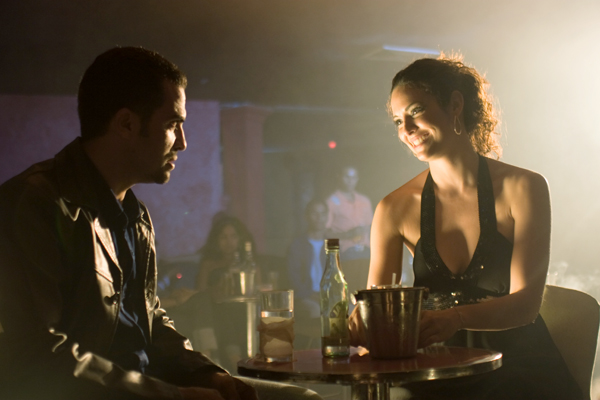|
Reviews of Recent Independent, Foreign, & Documentary Films in Theaters and DVD/Home Video

LA SOGA The 2002 favela saga City of God has a lot to answer for. Its worldwide success has since spawned a race of unsuccessful copycats, the developing-world gangster genre, which mixes casual violence, oblique political commentary, and slumming, seldom to interesting effect. The latest knock-off, La Soga (The Rope), desperately wants to be taken as an authentic, gritty portrayal of political corruption and the drug underworld in the Dominican Republic, but it’s really a cornpone melodrama coated in a thin layer of cinema vérité and stuffed with the laziest clichés of its kind. The filmmakers actually seem to have gone through a checklist: reggaeton soundtrack for chase scenes? Check. Overexposed film? Check. Documentary asides of cockfights, barefoot children running after cars, and colorful festivals? Check, check, check. When even the Fast and Furious franchise is using these elements in its latest installment, you know you should look elsewhere for inspiration. The film follows Luisito (writer and co-producer Manny Perez), a butcher’s son, known as “La Soga,” from a tough Dominican slum. As a boy, he saw his father gunned down by the cold-blooded thug Rafa (soulful-eyed Paul Calderon). He was then brought up under the tutelage of General Colon (Juan Fernandez) to become a hit man-vigilante, taking down drug dealers and other undesirables as he waited for the order to go after his dad’s killer. But El General won’t let him touch Rafa, now living in Washington Heights as a sort of stick-up man. He’s also apparently not paying Luisito much, as Luisito still works as a butcher. This means he’s a rung or so down from Jenny (Denise Quiñones) on the social ladder—his rich, beautiful neighbor and former childhood playmate who recently moved back to town from the States. But this also lets the filmmakers, with painfully strained irony, belabor the parallels between his two butchery businesses. (Luisito is also a vegetarian—a vegetarian butcher, sigh.) Of course, it’s a surprise to nobody but Luisito that a character named the General who commands his own personal death squad—and who also has shady dealings with U.S. agents—has ulterior and, gasp, impure motives for protecting Rafa. The low-budget film, shot on location in the D.R., looks and sounds authentic enough. It gets small details right, such as the carjackers who ride three men to a motorcycle, and even promulgates the widespread Latin American belief that the region’s crime originates largely from good-for-nothing criminals deported from the U.S. But even if the surface details are true, the dull, implausible, meandering plot never convinces us that Luisito’s late struggle with his conscience is anything more than the filmmakers’ operatic device.
Worse, the film’s inclusion of a brutal, real-life pig killing makes the
film’s melodramatic contortions look even more ridiculous. As a rite of
passage, young Luisito, in a flashback, has to kill a pig, and because
this ain’t no Hollywood film, the filmmakers hire a butcher and
slaughter an actual animal on camera, which lingers on the poor
beast’s eyes as it gets snuffed. For me, the ethical issues are less
pressing than the aesthetic ones: the animal’s actual death helps show
up the fakery of everything else. Especially a late and unintentionally
hilarious scene where Luisito, poised to kill a thug, stays his hand
at the last second when he hears the crook’s small child cry—just on
cue—off-screen. As Oscar Wilde famously wrote about the death of Little
Nell, you’d need a heart of stone not to laugh.
Brendon Nafziger
|

